Fleurs du Mal Magazine


Or see the index
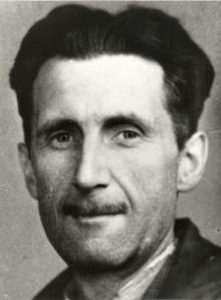
The Pagan
So here are you, and here am I,
Where we may thank our gods to be;
Above the earth, beneath the sky,
Naked souls alive and free.
The autumn wind goes rustling by
And stirs the stubble at our feet;
Out of the west it whispering blows,
Stops to caress and onward goes,
Bringing its earthy odours sweet.
See with what pride the the setting sun
Kinglike in gold and purple dies,
And like a robe of rainbow spun
Tinges the earth with shades divine.
That mystic light is in your eyes
And ever in your heart will shine.
George Orwell
(1903 – 1950)
The Pagan
• fleursdumal.nl magazine
More in: Archive O-P, Archive O-P, George Orwell, Orwell, George
Award-winning poet Maya C. Popa suggests that our restless desires are inseparable from our mortality in this pressing and precise collection.
 Rooting out profound meaning in language to wrench us from the moorings of the familiar and into the realm of the extraordinary, the volume asks, how do we articulate what’s by definition inarticulable? Where does sight end and imagination begin?
Rooting out profound meaning in language to wrench us from the moorings of the familiar and into the realm of the extraordinary, the volume asks, how do we articulate what’s by definition inarticulable? Where does sight end and imagination begin?
Lucid and musically rich, these poems sound an appeal to a dwindling natural world and summon moments from the lives of literary forbearers—John Milton’s visit to Galileo, a vase broken by Marcel Proust—to unveil fresh wonder in the unlikely meetings of the past. Popa dramatizes the difficulties of loving a world that is at once rich with beauty and full of opportunities for grief, and reveals that the natural arc of wonder, from astonishment to reflection, more deeply connects us with our humanity.
Maya C. Popa is the author of American Faith, recipient of the 2020 North American Book Prize. Her poems have appeared in the Nation, Poetry, and the Paris Review, among other publications. She lives in New York City.
Wound Is the Origin of Wonder
by Maya C. Popa
Publisher: W. W. Norton & Company (November 8, 2022)
Language: English
Hardcover: 96 pages
ISBN-10: 1324021365
ISBN-13: 978-1324021360
Price $26.95
• fleursdumal.nl magazine
More in: #Editors Choice Archiv, - Book News, Archive O-P, Archive O-P
Geluksvogels bevat een keuze uit Luigi Pirandello’s Novellen voor een jaar, in een blinkend nieuwe vertaling van Yond Boeke en Patty Krone.
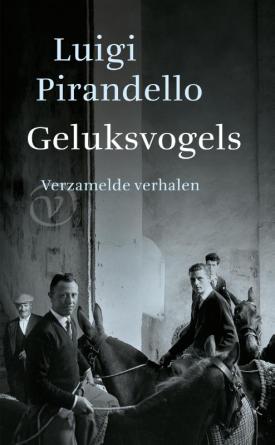 Pirandello schreef deze opmerkelijk hoogwaardige verzameling verhalen tussen 1894 en 1936. Zijn dood belette hem het project – één novelle voor elke dag van het jaar – te voltooien.
Pirandello schreef deze opmerkelijk hoogwaardige verzameling verhalen tussen 1894 en 1936. Zijn dood belette hem het project – één novelle voor elke dag van het jaar – te voltooien.
De diversiteit van zijn verhalen, die getuigen van groot psychologisch inzicht, een buitengewoon scherp gevoel voor humor en immens mededogen, is exemplarisch voor Pirandello’s enorme veelzijdigheid als schrijver.
Hij voert een breed scala aan markante personages ten tonele: van arme Siciliaanse boeren die tevergeefs strijden tegen de clerus tot wufte stedelingen die verstrikt raken in hun eigen overspel, van een wanhopige patiënt die in een New Yorks ziekenhuis uit het raam springt tot een geëxalteerde actrice die het moet opnemen tegen een vleermuis.
Pirandello laveert virtuoos tussen vlotte dialogen, van weemoed doortrokken landschapsbeschrijvingen en filosofische bespiegelingen over het aardse bestaan. Sommige verhalen blijken ook nu nog verrassend actueel.
Luigi Pirandello (1867-1936), geboren in een gegoede familie op Sicilië, kreeg in 1934 de Nobelprijs voor de Literatuur. De verfilming van zijn verhalen door Paolo en Vittorio Taviani, Kaos, werd wereldberoemd.
Geluksvogels
Novellen
Door Luigi Pirandello
Uitgeverij Van Oorschot
2022
Gebonden
832 pagina’s
ISBN 9789028213142
Prijs: € 45,00
• fleursdumal.nl magazine
More in: - Book News, Archive O-P, Luigi Pirandello, Pirandello, Luigi

Awake! Young Men of England
OH! give me the strength of the Lion,
The wisdom of reynard the Fox
And then I’ll hurl troops at the Germans
And give them the hardest of knocks.
Oh! think of the War Lord’s mailed fist,
That is striking at England today:
And think of the lives that our soldiers
Are fearlessly throwing away.
Awake! Oh you young men of England,
For if, when your Country’s in need,
You do not enlist by the thousand,
You truly are cowards indeed.
George Orwell
(1903 – 1950)
Awake! Young Men of England
• fleursdumal.nl magazine
More in: Archive O-P, Archive O-P, George Orwell, Orwell, George
Widely considered to be among the most important Italian poets of the twentieth century, Sandro Penna was born and raised in Perugia but spent most of his life in Rome.
 Openly gay, Penna wrote verses celebrating homosexual love with lyrical elegance.
Openly gay, Penna wrote verses celebrating homosexual love with lyrical elegance.
His writing alternates between whimsy and melancholia, but it is always full of light.
Juggling traditional Italian prosody and subject matter with their gritty urban opposites in taut, highly concentrated poems, Penna’s lyrics revel in love and the eruption of Eros together with the extraordinary that can be found within simple everyday life.
There is something ancient in Penna’s poetry, and something Etruscan or Greek about the poems, though the landscape is most often of Rome: sensual yet severe, sinuous yet solid, inscrutable, intangible and languorous, with a Sphinx-like and sun-soaked smile.
Penna’s city is eternal—a mythically decadent Rome that brings to mind Paris or Alexandria. And though the echoes resound—from Rimbaud, Verlaine, Baudelaire to Leopardi, D’Annunzio, Cavafy—the voice is always undeniably and wonderfully Penna’s own.
Sandro Penna (1906–77) was an Italian poet. During his life, he was awarded two of Italy’s most important literary awards, the Premio Viareggio and the Premio Bagutta. His work has been translated into many languages, including English, French, German, Japanese, and Spanish, and has appeared in numerous anthologies of Italian poetry.
Alexander Booth is a writer and translator and the recipient of a 2012 PEN Translation Fund grant for his translations of Lutz Seiler.
Sandro Penna
Within the Sweet Noise of Life
Selected Poems
Translated by Alexander Booth
ISBN: 9780857427878
Format: Hardback
Pages: 96
Rights: UCP
Publication Year: March 2021
Size: 5″ x 8.5″
Publisher: Seagull Books
$19.00
• fleursdumal.nl magazine
More in: #Editors Choice Archiv, - Book News, Archive O-P, Archive O-P, LGBT+ (lhbt+)
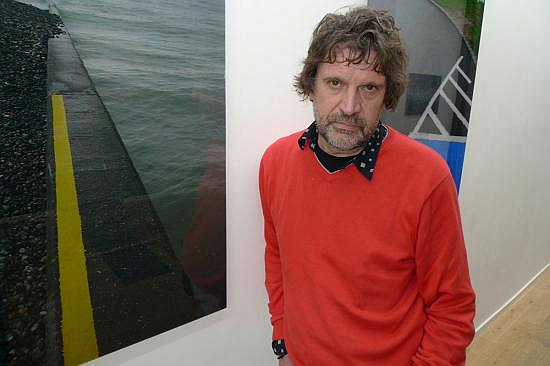
Ernest Potters tijdens zijn eerste solo-tentoonstelling sinds lang, in Luycks Gallery, 2012. (Foto: Joep Eijkens)
Ernest Potters timmerde niet alleen als fotograaf aan de weg, maar was ook jarenlang drijvende kracht en organisator van tal van activiteiten in de Tilburgse kunstwereld. Op 10 augustus 2022 overleed hij na een kort ziekbed.
door Joep Eijkens
Ernest Potters werd in 1953 te Tilburg geboren als zoon van de bekende pottenbakkers Henk en Lies Potters. Hij volgde zijn opleiding aan St. Joost Breda en was sinds 1974 werkzaam als fotograaf/fotojournalist. Vanaf de jaren zeventig werkte hij als freelance fotograaf onder meer voor muziekbladen als OOR en Hitkrant, voor het maandblad Jazz Nu en diverse landelijke dag- en weekbladen. Maar ook voor uiteenlopende (kunst)instellingen en andere opdrachtgevers in Tilburg en daarbuiten, waaronder diverse muziek-, dans- en theatergezelschappen.
Potters fotografeerde talloze theater- en dansvoorstellingen. Tot zijn favoriete onderwerpen hoorden architectuur en muzikanten. Wat dat laatste betreft was hij apetrots op een portret dat hij schoot van zijn idool Frank Zappa.
Ruimte X
Maar Potters was beslist méér dan fotograaf. Zo stichtte hij in 1980 met zijn toenmalige levenspartner, danseres Nora van den Eeckhout, Het Danshuis, gevestigd in de Telexstraat in Tilburg. Het betreffende pand werd later onder de naam Ruimte-X een bekend ‘multidisciplinair kunstenpodium’ waar tussen 1998 en 2012 talloze exposities, voorstellingen en culturele bijeenkomsten plaatsvonden. Potters hoorde bovendien tot degenen die aan de wieg stonden van de succesvolle Werkplaats L’Avventura Tilburg.
Ook kreeg Ernst Potters naam door de kunstexposities die hij elders in de stad organiseerde tijdens de Tilburgse kermis. En door de in literatuur, beeldende kunst, theater en muziek gespecialiseerde uitgeverij teleXpress die hij runde met zijn partner Ingrid Luycks. De producten waren steeds mooi verzorgde publicaties. Zijn eerste foto-expositie had hij in 1976 in het cultureel centrum Boerderij Denissen in Berkel-Enschot. Daarna volgden exposities in binnen- en buitenland.
Qua Vadis
In 2012 sloot Ruimte X de deuren en concentreerde Ernest Potters zich weer meer op zijn werk als fotograaf. Het was in de galerie van Luycks dat hij in datzelfde jaar voor het eerst sinds lange tijd weer solo eigen fotografisch werk exposeerde onder de titel Quo Vadis. Diverse solo- en duo-exposities volgden daarna, eveneens in Luycks Gallery.
Potters timmerde de afgelopen jaren sowieso steviger aan de weg als fotograaf. Zo begon hij eind 2020 op Instagram met een soort dagboek in foto’s van dingen en plekken die hij onderweg tegenkwam. Al dan niet alledaagse voorwerpen en plekken waaraan vrijwel niemand aandacht schenkt: van een weggegooid bierblikje op een hoop straatstenen tot een abstract detail van een stukje architectuur. Alsof hij wilde zeggen dat schoonheid ook op straat is te vinden, als je er maar oog voor hebt.
Ernest Potters maakte ook, en regelmatig in samenwerking met anderen, diverse fotoboeken zoals Hoog-Gaat-Ie. Fotoboek van de Tilburgse kermis met Paul Spapens en Lauran Wijffels, en vorig jaar nog Het nieuwe ritme van Tilburg. Dat was een coproductie met de eveneens Tilburgse fotograaf Wil van Dusseldorp over de metamorfose die de voormalige textielstad onderging sinds de jaren zestig. Potters nam daarin vooral het afgelopen decennium voor zijn rekening, met kleurenfoto’s die hij speciaal voor dit boek maakte. Het werd uitgegeven door stichting De NWE Stijl, waarin Ingrid Luycks één van de drijvende krachten is. Potters was ook de bedenker van tal van opmerkelijke boekconcepten en uitgaven, waaronder De Kanonbal. Requiem voor een wielrenner en dichtbundels van diverse Tilburgse stadsdichters.
Om ideeën zat Ernest Potters nooit verlegen en hij was ook altijd bereid ideeën van anderen de ruimte geven, vaak letterlijk in Ruimte X. Zijn betrokkenheid bij Tilburg was groot en hij zal in die stad worden gemist, maar zijn wereld was eindeloos veel groter dan stad of provincie.
Eerder gepubliceerd in: Brabant Cultureel. Digitaal podium voor kunst en cultuur
© Joep Eijkens, 11 augustus 2022
https://www.brabantcultureel.nl/
•fleursdumal.nl magazine
More in: #Biography Archives, Archive O-P, AUDIO, CINEMA, RADIO & TV, DANCE & PERFORMANCE, In Memoriam, Joep Eijkens, Photography

A Little Poem
A happy vicar I might have been
Two hundred years ago
To preach upon eternal doom
And watch my walnuts grow;
But born, alas, in an evil time,
I missed that pleasant haven,
For the hair has grown on my upper lip
And the clergy are all clean-shaven.
And later still the times were good,
We were so easy to please,
We rocked our troubled thoughts to sleep
On the bosoms of the trees.
All ignorant we dared to own
The joys we now dissemble;
The greenfinch on the apple bough
Could make my enemies tremble.
But girl’s bellies and apricots,
Roach in a shaded stream,
Horses, ducks in flight at dawn,
All these are a dream.
It is forbidden to dream again;
We maim our joys or hide them:
Horses are made of chromium steel
And little fat men shall ride them.
I am the worm who never turned,
The eunuch without a harem;
Between the priest and the commissar
I walk like Eugene Aram;
And the commissar is telling my fortune
While the radio plays,
But the priest has promised an Austin Seven,
For Duggie always pays.
I dreamt I dwelt in marble halls,
And woke to find it true;
I wasn’t born for an age like this;
Was Smith? Was Jones? Were you?
George Orwell
(1903 – 1950)
A Little Poem
• fleursdumal.nl magazine
More in: Archive O-P, Archive O-P, AUDIO, CINEMA, RADIO & TV, Orwell, George

Poem from Burma
Brush your teeth up and down, brother,
Oh, brush them up and down!
All the folks in London Town
Brush their teeth right up and down,
Oh! How they shine!
Aren’t they bloody fine?
Night and morning, my brother,
Oh brush them up and down!”
George Orwell
(1903 – 1950)
Poem from Burma
• fleursdumal.nl magazine
More in: Archive O-P, Archive O-P, George Orwell, Orwell, George

Summer-Like
Summer-like for an instant the autumn sun bursts out,
And the light through the turning elms is green and clear;
It slants down the path and ragged marigolds glow
Fiery again, last flames of the dying year.
A blue-tit darts with a flash of wings, to feed
Where the coconut hangs on the pear tree over the well;
He digs at the meat like a tiny pickaxe tapping
With his needle-sharp beak as he clings to the swinging shell.
Then he runs up the trunk, sure-footed and sleek like a mouse,
And perches to sun himself; all his body and brain
Exult in the sudden sunlight, gladly believing
That the cold is over and summer is here again.
But I see the umber clouds that drive for the sun,
And a sorrow no argument ever can make away
Goes through my heart as I think of the nearing winter,
And the transient light that gleams like the ghost of May;
And the bird unaware, blessing the summer eternal,
Joyfully labouring, proud in his strength, gay-plumed,
Unaware of the hawk and the snow and the frost-bound nights,
And of his death foredoomed.
George Orwell
(1903 – 1950)
Summer-Like
• fleursdumal.nl magazine
More in: 4SEASONS#Summer, Archive O-P, Archive O-P, George Orwell, Orwell, George

A Dressed Man
A dressed man and a naked man
Stood by the kip-house fire,
Watching the sooty cooking-pots
That bubble on the wire;
And bidding tanners up and down,
Bargaining for a deal,
Naked skin for empty skin,
Clothes against a meal.
‘Ten bob it is,’ the dressed man said,
‘These boots cost near a pound,
This coat’s a blanket of itself.
When you kip on the frosty ground.’
‘One dollar,’ said the nakd man,
‘And that’s a hog too dear;
I’ve seen a man strip off his shirt
For a fag and a pot of beer.’
‘Eight and a tanner,’ the dressed man said,
George Orwell
(1903 – 1950)
A Dressed Man
• fleursdumal.nl magazine
More in: Archive O-P, Archive O-P, George Orwell, Orwell, George

Our Minds Are Married,
But We are Too Young
Our minds are married, but we are too young
For wedlock by the customs of this age
When parent homes pen each in separate cage
And only supper-earning songs are sung.
Times past, when medieval woods were green,
Babes were betrothed, and that betrothal brief.
Remember Romeo in love and grief—
Those star-crossed lovers—Juliet was fourteen.
Times past, the caveman by his new-found fire
Rested beside his mate in woodsmoke’s scent.
By our own fireside we shall rest content
Fifty years hence keep troth with hearts desire.
We shall remember, when our hair is white,
These clouded days revealed in radiant light.
George Orwell
(1903 – 1950)
Our Minds Are Married, But We are Too Young
• fleursdumal.nl magazine
More in: Archive O-P, Archive O-P, George Orwell, Orwell, George, Romeo & Juliet
Geluksvogels bevat een keuze uit Luigi Pirandello’s Novellen voor een jaar, in een blinkend nieuwe vertaling van Yond Boeke en Patty Krone.
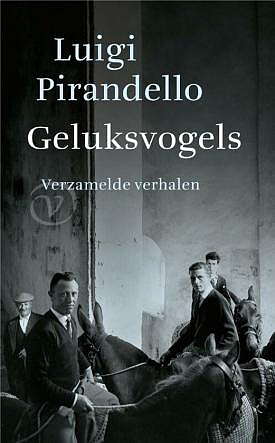 Pirandello schreef deze opmerkelijk hoogwaardige verzameling verhalen tussen 1894 en 1936. Zijn dood belette hem het project – één novelle voor elke dag van het jaar – te voltooien.
Pirandello schreef deze opmerkelijk hoogwaardige verzameling verhalen tussen 1894 en 1936. Zijn dood belette hem het project – één novelle voor elke dag van het jaar – te voltooien.
De diversiteit van zijn verhalen, die getuigen van groot psychologisch inzicht, een buitengewoon scherp gevoel voor humor en immens mededogen, is exemplarisch voor Pirandello’s enorme veelzijdigheid als schrijver.
Hij voert een breed scala aan markante personages ten tonele: van arme Siciliaanse boeren die tevergeefs strijden tegen de clerus tot wufte stedelingen die verstrikt raken in hun eigen overspel, van een wanhopige patiënt die in een New Yorks ziekenhuis uit het raam springt tot een geëxalteerde actrice die het moet opnemen tegen een vleermuis.
Pirandello laveert virtuoos tussen vlotte dialogen, van weemoed doortrokken landschapsbeschrijvingen en filosofische bespiegelingen over het aardse bestaan. Sommige verhalen blijken ook nu nog verrassend actueel.
Luigi Pirandello (1867-1936), geboren in een gegoede familie op Sicilië, kreeg in 1934 de Nobelprijs voor de Literatuur. De verfilming van zijn verhalen door Paolo en Vittorio Taviani, Kaos, werd wereldberoemd.
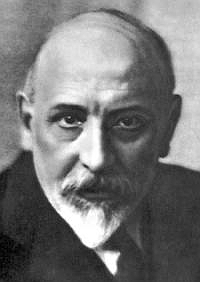 # new translations
# new translations
Geluksvogels Verzamelde verhalen
Auteur: Luigi Pirandello
Taal: Nederlands
Vertaald door Yond Boeke & Patty Krone
Hardcover
Druk: 1 februari 2022
832 pagina’s
ISBN 9789028213142
€ 45,00
• fleursdumal.nl magazine
More in: #Editors Choice Archiv, Archive O-P, Archive O-P, Pirandello, Luigi, Pirandello, Luigi
Thank you for reading Fleurs du Mal - magazine for art & literature